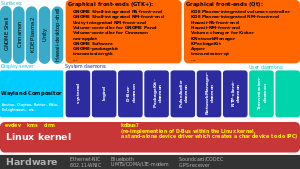PackageKit
|
| |
|
PackageKit is a system daemon, various graphical front-ends are available | |
| Original author(s) | Richard Hughes |
|---|---|
| Initial release | 2007 |
| Stable release |
1.1.2
/ 12 July 2016[1] |
| Repository |
github |
| Development status | Active |
| Written in | C, C++, Python |
| Operating system | Linux |
| Type | Package management system |
| License | GNU General Public License |
| Website |
www |
PackageKit is a free and open-source suite of software applications designed to provide a consistent and high-level front end for a number of different package management systems. PackageKit was created by Richard Hughes in 2007,[2][3] and first introduced into an operating system as a default application in May 2008 with the release of Fedora 9.[4]
The suite is cross-platform, though it is primarily targeted at Linux distributions which follow the interoperability standards set out by the freedesktop.org group. It uses the software libraries provided by the D-Bus and Polkit projects to handle inter-process communication and privilege negotiation respectively.
Since 1995, package formats have been around, since 2000 there have been dependency solvers and auto-downloaders as a layer on top of them around, and since 2004 graphical front-ends. PackageKit seeks to introduce automatic updates without having to authenticate as root, fast-user-switching, warnings translated into the correct locale, common upstream GNOME and KDE tools and one software over multiple Linux distributions.[5]
Software architecture
PackageKit itself runs as a system-activated daemon, packagekitd, which abstracts out differences between the different systems. A library called libpackagekit allows other programs to interact with PackageKit.[6]
Features include:
- installing local files, ServicePack media and packages from remote sources
- authorization using Polkit
- the use of existing packaging tools
- multi-user system awareness – it will not allow shutdown in critical parts of the transaction
- a system-activated daemon which exits when not in use
Front-ends
Graphical front-ends for PackageKit include:

 GNOME Software uses GTK+
GNOME Software uses GTK+ gnome-packagekit is obsoleted
gnome-packagekit is obsoleted
pkcon operates from the command-line.[7]
Back-ends
A number of different package management systems (known as back-ends) support different abstract methods and signals used by the front-end tools.[8] Back-ends supported include:
- Advanced Packaging Tool (APT)
- box
- Conary
- hawkey[9] & librepo,[10] the libraries upon which DNF, (the successor to yum) builds
- Entropy
- Opkg
- Pacman
- PiSi
- poldek
- Portage
- razor
- Smart Package Manager
- urpmi
- YUM
- ZYpp
See also
References
- ↑ Richard Hughes (20 May 2016). "PackageKit - Where can I download it?". freedesktop.org. Retrieved 20 May 2016.
- ↑ "Installing and Updating Software Blows Goats". Richard Hughes. Retrieved 18 January 2011.
- ↑ "Richard Hughes' blog posts about PackageKit". Richard Hughes. Retrieved 18 January 2011.
- ↑ "Releases/9/FeatureList". Fedora Project Wiki. Fedora Project. 28 May 2008. Retrieved 7 July 2015.
- ↑ "Introduction to PackageKit, a Package Abstraction Framework" (PDF). Richard Hughes. 2008-02-24. Retrieved 2014-04-11.
- ↑ "PackageKit Reference Manual". packagekit.org. Retrieved 10 July 2009.
- ↑ "HowTo use pkon".
- ↑ "Frequently asked questions". packagekit.org. Retrieved 10 July 2009.
- ↑ "hawkey on github".
- ↑ "librepo on github".

